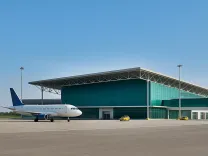Why Did Israel Lower Its Growth Forecast Due to Conflict and US Tariffs?

Synopsis
Key Takeaways
- Israel's growth forecast for 2025 revised to 3.6%
- Impact of US tariffs predicted to reduce global trade by 2%
- Inflation surge expected to affect economic activity
- 2026 growth forecast adjusted to 4.4%
- Military engagements remain a critical factor
Jerusalem, May 30 (NationPress) The Israeli Ministry of Finance has revised its growth forecast for 2025 down to 3.6 percent, a significant decrease from the 4.3 percent that was anticipated in January.
On Thursday, the ministry detailed that the previous baseline forecast had considered a decrease in military engagement and recruitment for this year, a scenario that has not yet occurred, as reported by Xinhua news agency.
The updated outlook predicts an increased mobilization of reserve troops for combat activities in the second quarter of 2025, with a gradual easing of reserve recruitment expected only from the third quarter onwards.
This new projection also factors in the effects of the recent US import tariffs and the latest economic data concerning Israel's economic performance.
According to the Israeli ministry, the rise in US tariffs is likely to cause a decline of approximately two percent in global trade during 2025 and 2026.
Furthermore, the growth forecast for the Israeli economy in 2026 has been adjusted downwards from 5.4 percent to 4.4 percent.
Gad Lior, a leading analyst at the Yedioth Ahronoth newspaper, shared with Xinhua that the downward revision of the growth forecast, coupled with an unexpected surge in inflation within Israel, is likely to result in reduced economic activity and a downturn in tax revenue, alongside increased government expenditure.









